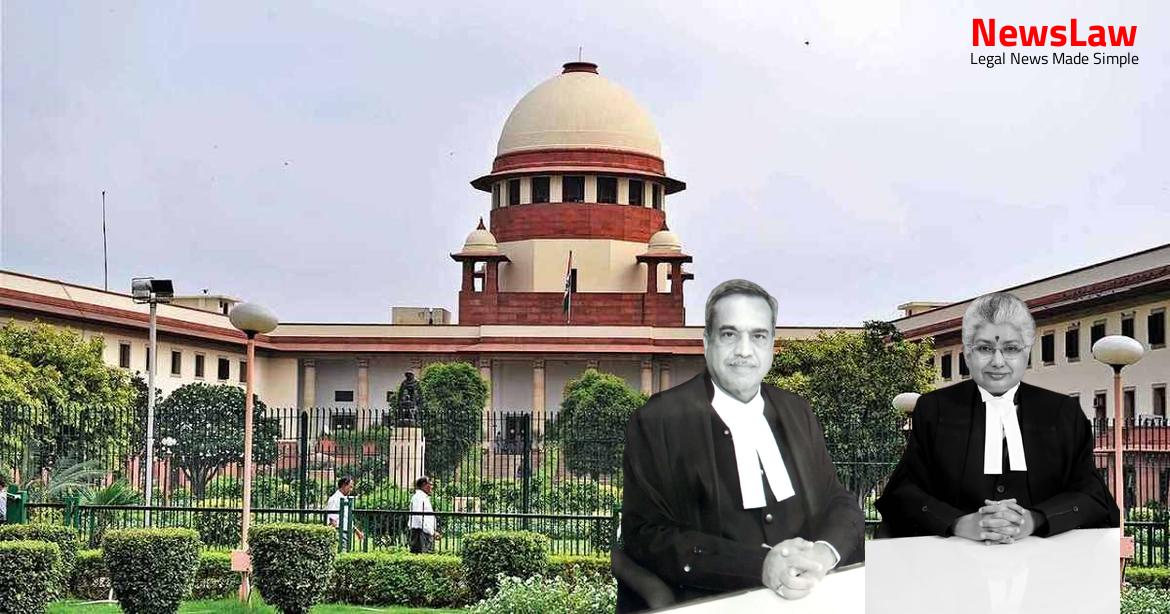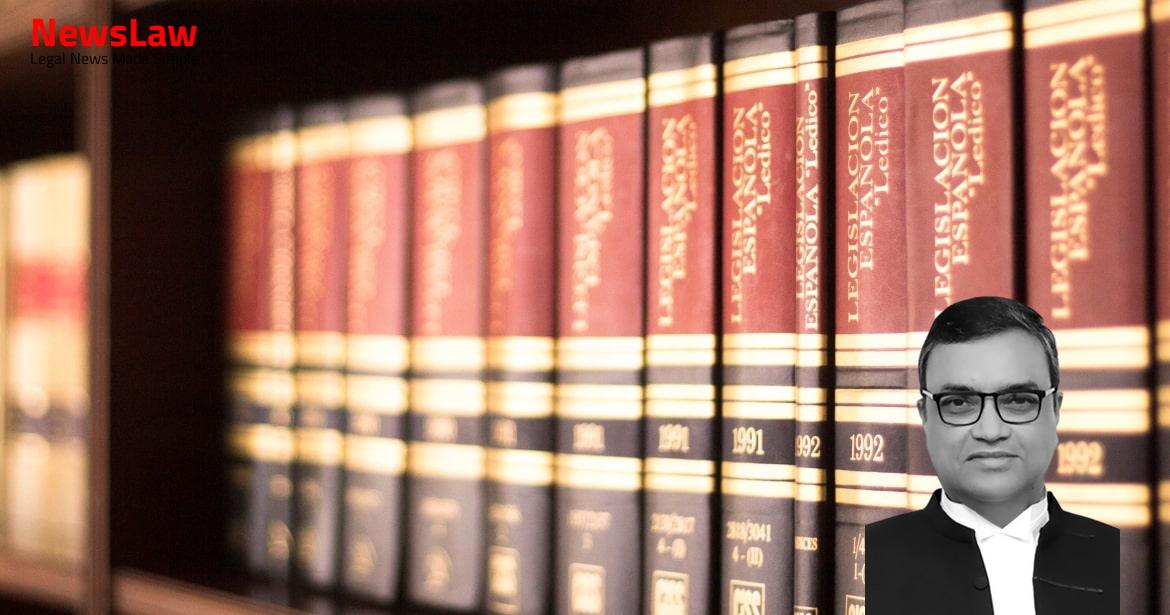Delve into the detailed legal analysis conducted by the court regarding the interpretation of electricity duty levy provisions. The case involves a deep dive into the complex realm of taxation on energy supply, shedding light on the nuances of legislative competence and jurisdiction. Stay tuned to unravel the legal intricacies surrounding this crucial aspect of electricity consumption and sale.
Facts
- Definition of the term ‘consumer’ is crucial in the present appeal as the appellant argues that the term ‘value of energy’ in Section 3 does not apply to them since the definition of ‘consumer’ excludes a licensee.
- The appellant, a sugar mill company, uses sugarcane waste for electricity production, supplying surplus energy to BSEB.
- NTPC supplied electricity exclusively to Electricity Boards.
- A notice was issued based on a report by the Accountant General (Audit) Bihar.
- The appellant challenged the imposition of electricity duty for supplying electricity to BSEB.
- The Bihar Electricity Duty Act 1948 was empowered the State Government to levy electricity duty on consumed or sold energy units.
- Amendments in 2002 allowed the levy based on units or value of energy at specified rates.
- Notices of demand were issued for electricity duty and penalty for specific years.
- A writ petition was filed challenging the imposition of electricity duty.
- The definition of ‘value of energy’ was amended through the Bihar Finance Act 2012.
- A notification granted an exemption from electricity duty on electricity generated by captive plants.
- A notification specified rates of duty in the Schedule.
- The first respondent issued notifications fixing the rate of duty on consumption or sale of electricity.
- The appellant contested the tax levy on supplying electricity to BSEB citing reasons related to the Act’s provisions and BSEB’s status as a licensee.
- The appellant cited a resolution providing exemptions for cogeneration to sugar and allied industries.
- The High Court struck down notifications and an amendment to Section 3(1) of the Bihar Electricity Act due to lack of guidelines for interpreting ‘value of energy’.
- High Court de-tagged writ petitions on 20 October 2016, distinguishing between NTPC as a power generation company and the appellant as a sugar mill generating electricity from molasses.
- Special leave petitions were summarily dismissed by a two-judge Bench on 3 July 2017, advising the appellant to pursue the alternative statutory remedy provided.
- Assistant Commissioner of Commercial Tax rejected appellant’s objection, confirming demand of electricity duty and penalty due to selling electricity in excess of consumption.
- High Court tagged writ petitions by appellant and NTPC on 2 December 2015, stating the issues raised were similar.
- High Court observed legislative incompetence of State to tax sale of electricity not for consumption, as per a previous judgment.
- High Court also noted that duty under Bihar Electricity Act applies to power generation companies selling to consumers as defined in the legislation.
- High Court declined to entertain appellant’s writ petition, suggesting the dispute to be resolved through statutory remedy provided by the Bihar Electricity Duty Act 1948.
- High Court’s decision in NTPC’s case concluded that electricity duty cannot be imposed on power generation companies supplying electricity to licensees like the Electricity Board.
- High Court dismissed appellant’s writ petition, citing the need for factual determination on the nature of electricity supply to BSEB as a reason.
Also Read: Electoral Malpractices in Mayor Election
Arguments
- Section 3 of the statute includes two parts: (i) levying tax on the ‘value of energy’ consumed and (ii) levying tax on the ‘units’ of energy sold.
- Section 2(ee) defines the phrase ‘value of energy’ and pertains to a sale to the consumer.
Also Read: Balancing Power and Transparency: Electoral Bonds Struck Down, Disclosure Mandated
Analysis
- Section 4A provides that duty shall be leviable ‘at each point in a series of sales of energy’.
- If Section 3 is read in a restricted manner by excluding the ‘units’ of energy sold in the definition, then it would render Sections 3(2)(c), 4 and 4A of the Act redundant.
- Section 4A(2) states that the amount of duty paid at ‘each preceding stage of sale’ shall be adjusted at the subsequent stage.
- Section 4 provides that every licensee shall pay duty to the State Government on the ‘units of energy consumed or sold by him’.
- Section 3 of the Act is the charging provision of the statute which states that tax shall be levied either on the units or on the value of the energy consumed or sold.
- Section 2(1) defines the phrase ‘value of energy’ as the charge payable by the consumer to the licensee or by the consumer to the person who generates the energy.
- Section 3(2)(c) provides that no duty shall be leviable on the units of energy consumed by the licensee in the construction, maintenance and operation of its electrical undertaking.
- The notification states that for the electricity energy that is consumed or sold for any purpose other than irrigation, the rate of duty shall be six per centum of the ‘value of energy’.
- The term ‘consumer’ has been defined in Section 2(b) of the Bihar Electricity Act.
- The appellant supplies electricity to BSEB which is undertaking the business of distributing electricity.
- The appellant is not supplying electricity to any other person.
- Section 2(d) defines the term ‘licensee’ to include the Bihar Electricity Board.
- The phrase ‘value of energy’ states that it is the charge payable by the consumer to either the licensee or the generator.
- BSEB pays electricity duty for the electricity sold by it to consumers, including the electricity supplied by the company to the Board.
- The levy of tax on the electricity supplied by the company would amount to double taxation.
- The question of filing a return under Sections 6B(1) and 5A of the Act does not arise when the appellant is not liable to pay the tax.
- Even if it is conceded that the State has the power to levy tax on the supply of electricity by the generator to the licensee under Section 3 of the Act, the Government of Bihar has not exercised its power since under Section 3, a notification must be issued for specifying the rate of charge.
- The appellant, a sugar mill producing electricity from bagasse, challenged the imposition of tax by the State Government on the sale of electricity to BSEB.
- The High Court entertained the writ petition and had to determine if the supply of electricity by the appellant falls under the ambit of Section 3 of the Act.
- The Patna High Court interpreted Section 3 with reference to definitions and held that the sale to a licensee for eventual consumption can be taxed.
- The definition of ‘value of energy’ only includes supply to the consumer, and there is no dispute on the transactions between the appellant and BSEB.
- Challenges were raised on the jurisdiction of taxing authorities, and the High Court had jurisdiction to address them.
- The High Court dismissed the appellant’s writ petition while entertaining NTPC’s petition, initially tagged for similar issues but later de-tagged.
- Despite the availability of alternate remedies, the High Court can still exercise writ jurisdiction if the authority acts beyond its scope.
- Interpretation of Entry 53 of the Constitution was crucial in determining the taxing authority on the sale of electricity by the appellant to BSEB.
- A prior show cause notice/provisional assessment order was issued to the assessee for unauthorized use of electricity under Section 126(1) of the Electricity Act 2003.
- The rights of the parties must be determinable without factual reference to classify a question as one of law.
- The meaning of ‘sale’ and ‘consumption’ of electricity is synonymous as per judicial interpretation.
- Legislative competence is lacking for the state to levy tax on electricity supply by the generator to the licensee.
- The facts in the NTPC case and the appellant’s writ petition were similar.
- The interpretation of the phrase ‘value of energy’ was limited in the judgment.
- Entry 53 of List II was construed as ‘Taxes on consumption or sale for consumption of electricity’ by a Constitution Bench.
- The High Court declined to entertain the writ petition citing alternate statutory remedies and factual disputes.
- The appellant challenged the imposition of electricity duty and penalty primarily on two grounds, one being the limitation of the power of the first respondent to levy tax on energy consumed or sold.
- The principle of alternate remedies and exceptions was reiterated in recent judicial decisions.
- The High Court made an error in declining to entertain the writ petition.
- The matter is amenable to the writ jurisdiction of the High Court.
- The case is remanded back to the High Court for a fresh disposal.
- The issues raised by the appellant are questions of law that require a comprehensive reading of the Bihar Electricity Act.
- The determination is needed on whether tax can be levied on the supply of electricity by a power generator supplying electricity to a distributor.
- The court needs to decide if the first respondent has the legislative competence to levy duty on the sale of electricity to an intermediary distributor.
Also Read: Recall of Resolution Plan Approval: Legal Analysis
Decision
- The appeal is disposed of with no order as to costs
- Pending applications are disposed of
- The writ petition is restored to the file of the High Court for fresh determination
- An application for amendment of the cause title was filed by the appellant
- The application for amendment is allowed
Case Title: M/S. MAGADH SUGAR AND ENERGY LTD. Vs. THE STATE OF BIHAR (2021 INSC 539)
Case Number: C.A. No.-005728-005728 / 2021



